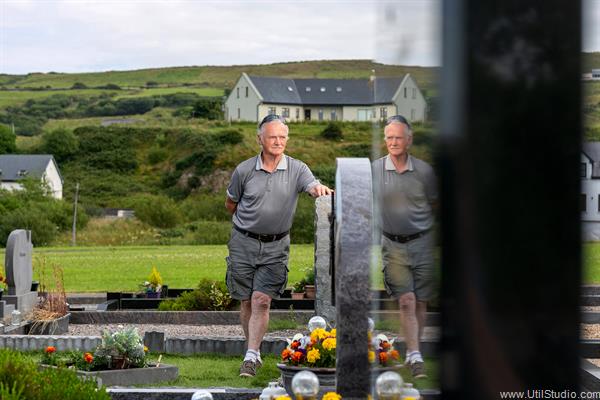“GARDAÍ are keeping an open mind on the latest tragedy to hit the county- the death of a young woman whose body was found in a burned out mobile home in Tubber last Friday afternoon.”
The Clare Champion,
April 15, 2005.
When your world comes crashing down, it’s often when your phone rings on a perfectly ordinary day.
That’s how it happened for Johnny O’Loughlin 14 years ago. On a spring evening, Shane Bowe, the partner of his 23-year old daughter Emer, rang him in a state of distress, just as Johnny was clocking off.
“I was driving a truck, I was drawing pre-cast flooring out of Whelan’s. I was finished and I was coming out of the quarry heading home. I got a phonecall from Shane, her boyfriend, they were lovers for years and years. He was a carpenter, he rang me and told me that Emer was missing, her camera was there, the keys of her car were there, the dogs were around, and there was a mobile home burned beside them. He thought there was a body there but that it was very small for Emer. But sure I knew in my heart.”
Johnny, who is from Ennistymon but now lives in Inagh, knew that Emer wasn’t the type who would just be gone away without a word. He says he could sense it was her body that was in the mobile home.
“Oh, I did, once she wasn’t around. She was one who wouldn’t go off on her own. She might go up a mountain in the Burren taking photographs but the dogs would be with her, she had two lovely dogs. I knew, I sensed something.”
He went home, changed his clothes and made his way up to the townland of Ballybornagh, between Tubber and Kinvara, where his daughter’s life had ended.
14 years of pain
The grief that followed that afternoon’s shock soon took hold in his heart and his mind, and more than 14 years on, he acknowledges that the emotion is just as raw today. “It never changes. When someone dies tragically like that, it’s different. If someone dies in an accident, you’d put it out of your mind for a while. With this thing, you never put it out of your mind, it is always there. Always thinking about it every day,” says Johnny.
Every April, when her anniversary comes around, Johnny takes the day off work, goes to the grave and lays flowers.
With some others who loved Emer, he goes to where she died. Afterwards, they have some food in O’Grady’s of Gort, as they remember her.
While the anniversary is a heightened time, the memory of what Johnny lost is always with him. “It doesn’t make any difference what you are doing, it’ll always hit you sometime. Every day, oh yeah.”
It’s the same for other people who were close to Emer, who was a student of art at Galway-Mayo Institute of Technology and whose talents had seen her win a place at the National College of Art and Design.
“She was brilliant at it. She used to have a camera and she’d take photographs everywhere.”
Johnny’s partner is Brigid O’Leary and he says her support was crucial to him when tragedy struck.
“She was a great friend of Emer’s and she was my rock when Emer died, I’ll tell you that.”
He fondly remembers how Emer loved visiting second-hand shops, how she introduced Brigid to them and how she in turn “got hooked” on calling to them then.

Johnny O’Loughlin at the grave of his daughter Emer at Ennistymon Graveyard on Tuesday.Pic Arthur Ellis.
A former soldier, Johnny feels that his time in the army has helped to make him more resilient than he would otherwise be, but his own tragedy has caused him huge pain and he needs to avoid certain situations.
For one thing, he stays away from the daily news, which always has details of misfortunes that have struck other ordinary people.
“Since Emer died, I don’t ever listen to the news on the radio or buy a paper, it’s all tragedies. I keep away from it, there are tragedies here and tragedies there.”
Attending funerals is a way of showing respect to people who have died and their loved ones,but going to them is just too much to ask of Johnny now.
“Another thing, when tragedies happen, that’s when it would hit you. When there is a local tragedy or something, that’s when you think of it. All the funerals now I don’t go to, I’d love to go but I couldn’t, it would be too emotional. That happens a lot.”
Johnny keeps himself very active. He works in landscaping, while he enjoys golf and spending time on his boat, which he keeps in Liscannor. While he enjoys an occasional drink, he says it is important not to use alcohol as a crutch at a difficult time. “Keeping busy is important, don’t be going into the pub.”
While people might feel a bit awkward about talking to him about his loss, he is very happy to do so and, in fact, feels that getting it out is very beneficial.
“You need to talk about it, you don’t hold it in. Anyone who asks me to talk about it, I talk about it, I make no bones about it, you can’t keep it in all the time.”
He encourages other people who have suffered tragedies to talk to him about how they are doing, and says the benefits of doing that are very clear.
The loss he suffered will of course always be with him, but spending some time sharing definitely helps him feel some relief from the burden of grief. “What can I say like, all the talking you do won’t bring her back, but it takes something away from you.”
“Griffin is suspected of murdering a young woman in Galway, Ireland in April 2005.”
“In the days following the attack, Griffin allegedly travelled to a nearby island where he was seen on a clifftop. Items of Griffin’s clothing were later found at the location, however police believe that Griffin may have attempted to fake his own death and is now hiding from the authorities.”
“In 2005 Griffin is known to have travelled from London to Germany. His current location is not known.”
Excerpts from an Interpol notice about the main suspect, John Griffin, in relation to the death of Emer O’Loughlin.
To put it mildly, the investigation into the death of Emer O’Loughlin has not been a success.
Fourteen years on, the killer has not been apprehended, while the main suspect has evaded the attempts of gardaí to corner him and is thought to have begun a new life abroad.
John Griffin owned the mobile home in which Emer’s remains were found. A Galway man with a history of violence and drug addiction, he was found acting in an odd manner on Inis Mór just a few days after Emer’s death.
When he began throwing rocks at people who approached him, the gardaí were summoned and after a long stand off, he was taken in by them.
Brought into psychiatric care in Ballinasloe, he got rid of his distinctive dreadlocks and beard and was somehow allowed to leave after just five days. He went back to the Aran Islands, where it is believed he faked his own death.
At the time, the case of Dubliner Colin Whelan – who faked his own suicide in 2001 after killing his wife – was also in the news.
Johnny has no doubt that the guards put far too much focus on Shane, Emer’s partner, neglecting the red flags around the man who owned the mobile home that her body had been found in.
“Every time I saw Shane, he was in the back of a squad car. They never thought of Griffin.”
He is angry about how the investigation went and privately scathing about the performance of some of those involved. Given that it was actually Griffin’s mobile home that had burned out, he feels he was someone who obviously should have been looked at very closely from the very beginning.
“All they were worried about was did Shane do it, did Shane know about it. He was gone to work; she was off because it was the time the Pope died and the colleges were closed.”
Emer’s body was exhumed in 2010. It was confirmed that she had died a violent death but Johnny says the family were already quite sure that had been the case.
Prior to Emer’s death, both herself and Shane used to have a lot of trouble with electricity in their mobile home, which led to them bringing their phones to Griffin’s place to be charged.
They had spent some €400 on trying to repair the problem and, with hindsight, Johnny believes their cables might have been subject to repeated sabotage.
While gardaí have said Griffin may be living in Europe, Johnny says he is “nearly certain” he is in Morocco, after a person who had been in the country made contact with him to say he had seen the wanted man there.
Johnny says the man who saw Griffin was also in contact with gardaí, but he feels there is little interest in pursuing this lead, for whatever reason.
The man who reported the information wasn’t properly dealt with, he feels. “They gave him pictures to put up in Morocco. He wouldn’t do it, that’d be driving him deeper away.”
So 14 years later, justice is as far away as ever for Johnny and his family. He says he hasn’t heard from the gardai “in a long, long time”.
Johnny keeps putting one foot in front of the other but his life is very tainted by the tragedy and he expects it will remain so. “You hear of tragedies and people say ‘will they ever get over it’, you never get over it. You never get over something like that.”
Owen Ryan
Owen Ryan has been a journalist with the Clare Champion since 2007, having previously worked with a number of other publications in Limerick, Cork and Galway. His first book will be published in December 2024.

